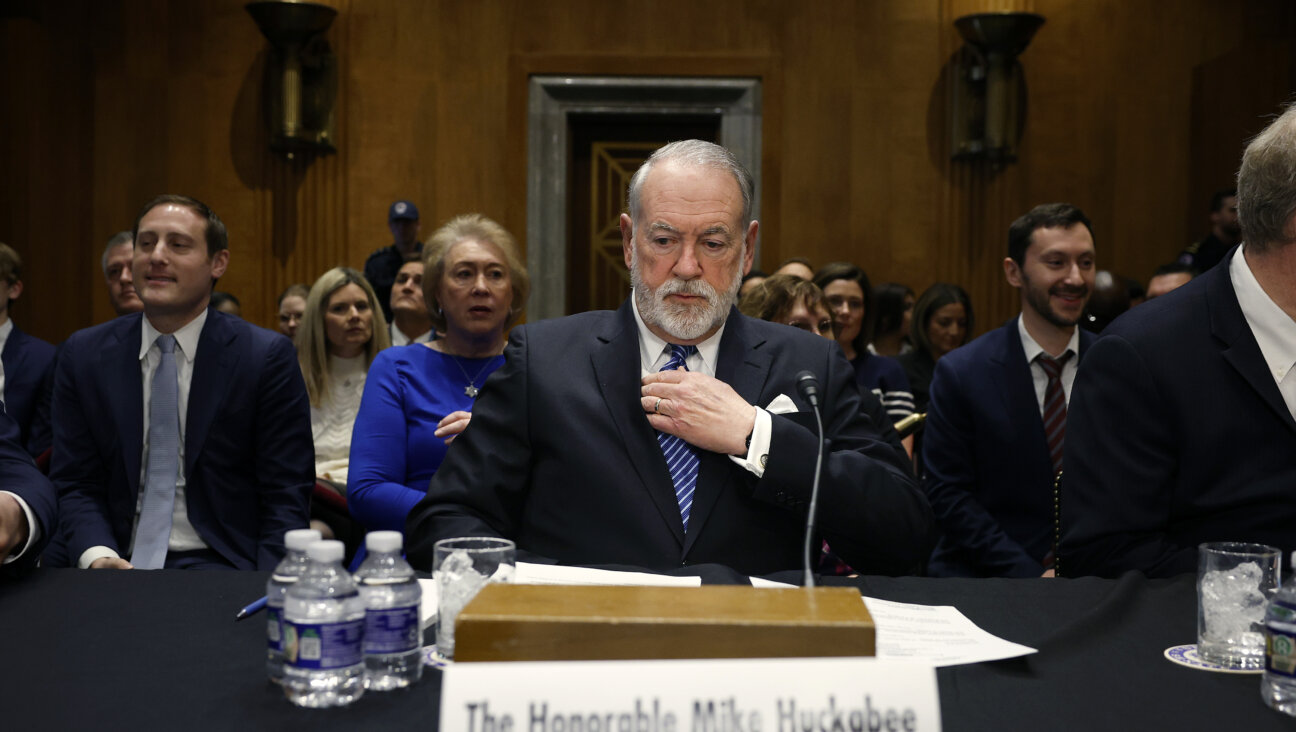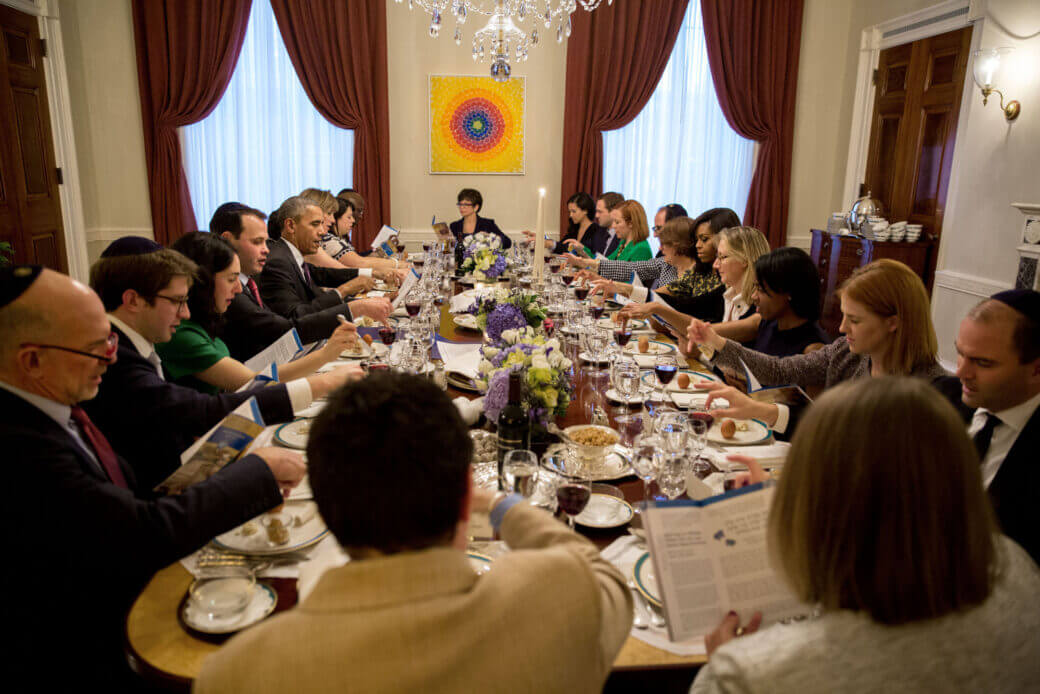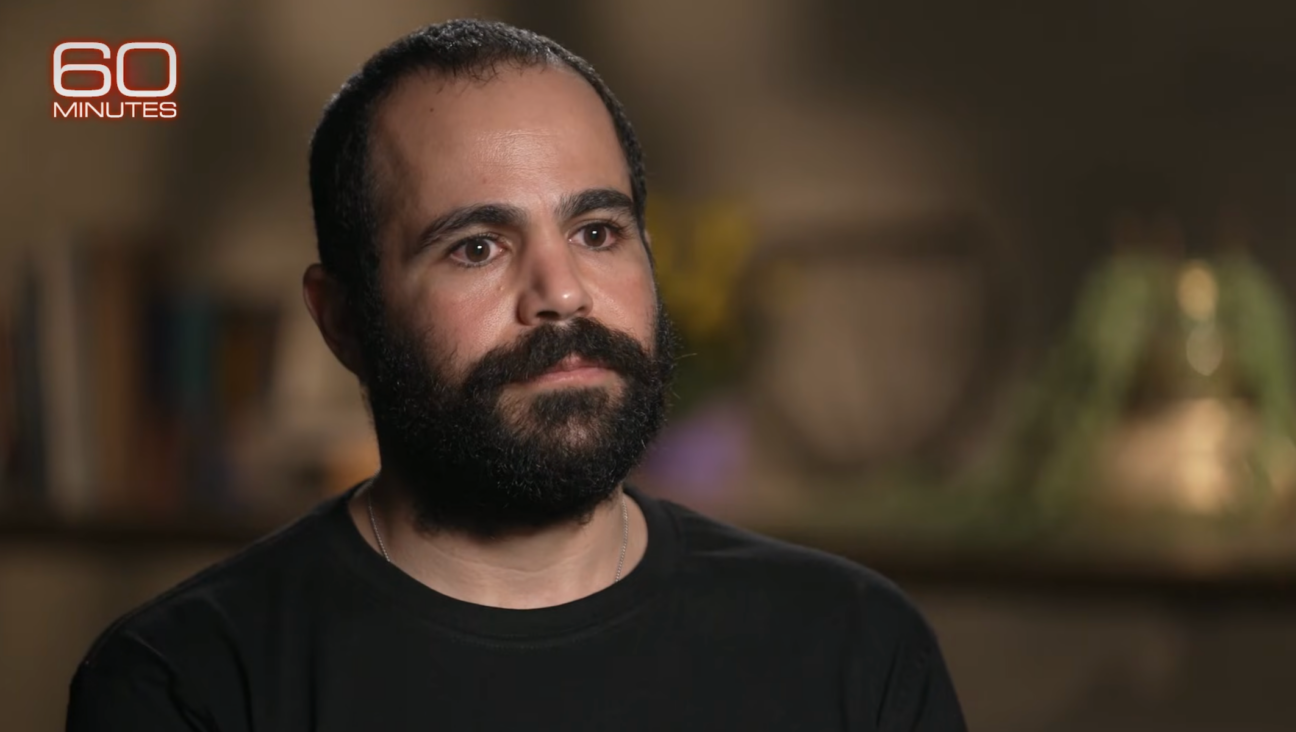Baker Group Advisers ‘Surprised,’ ‘Upset’ at Report’s Israel-Iraq Link
Washington – Several advisers to the bipartisan Iraq Study Group were surprised and upset by the decision of panel leaders to argue that American success in Iraq depends in part on progress in resolving the Israeli-Palestinian conflict, the Forward has learned.
Issued eight weeks ago, the Iraq Study Group’s final report asserted that “the United States will not be able to achieve its goals in the Middle East unless the United States deals directly with the Arab-Israeli conflict.” The two co-chairmen of the panel — James Baker, who served as secretary of state under the first President Bush, and Lee Hamilton, a former Democratic congressman from Indiana and vice-chairman of the 9/11 Commission — have since advanced the argument in media interviews. Supporters of an increased American role in kick-starting the peace process have hailed the final report, while some pro-Israel activists and Jewish groups have worried that it could lead to pressure on Jerusalem.
Baker and Hamilton appeared Tuesday before the Senate Foreign Relations Committee as part of the ongoing discussion in the committee on ways to solve the Iraq situation. The committee’s Democratic chair, Senator Joseph Biden of Delaware, has already stated that he rejects the linkage the study group made between Israel and Iraq. “Even if a peace treaty were signed tomorrow, it would not end the civil war in Iraq,” Biden said during a January 17 hearing.
In interviews with the Forward, several of the experts who advised the panel said they were shocked that the Israeli-Palestinian issue was included in the final report, since they had been told not to address the matter in their recommendations. “They kept on telling us it is a sensitive issue and that it has too many political implications,” one of the experts said.
The objections went beyond process, with some advisers arguing to the Forward that progress in Israeli-Palestinian talks is desirable but would have little impact on the situation in Iraq. “Desirable as it may be, we cannot obtain progress in the Israeli-Palestinian front right now, and even if we could, it would take years and the impact on Iraq would be less significant than some think,” said Wayne White, a former State Department official and one of the expert advisers.
The study group’s expert advisers were divided among four different working groups based on their areas of expertise and offered up recommendations to the panel. The panel’s professional staffers then took these suggestions and used them to produce the final report that was eventually approved by Baker, Hamilton and the other eight members of the Iraq Study Group.
According to several advisers, the staffers who wrote the chapter in question were Edward Djerejian, a former ambassador to Syria and Israel with close ties to Baker, and Christopher Kojm, a former aide to Hamilton who held senior positions in the State Department and the 9/11 Commission.
One staff member argued that insisting on making a clear linkage between the Israeli-Palestinian conflict and the situation in Iraq was “stupid” and “exposed the report to criticism.” That staff member pointed to Djerejian as the person who inserted the language regarding Israel.
Through a spokesman, Djerejian declined to comment on this issue.
At the Senate committee hearing this past Tuesday, Baker defended the decision to link progress in the Israeli-Arab conflict and progress in Iraq.
The former secretary of state said: “Some have asked us: What does the Arab-Israeli conflict have to do with the war in Iraq? Why make one problem harder by taking on two? The answer is simple. It is difficult to establish regional stability in the Middle East without addressing the Arab-Israeli issue. We want other countries, especially the Sunni Arab countries, to help us. When we go to talk to them about Iraq, they will want to talk about the Arab-Israeli conflict.”
Baker commended Secretary of State Condoleezza Rice on her efforts to renew peace talks between Israelis and Palestinians, but said that he and Hamilton “feel particularly strong” that the United States is missing an opportunity by refusing to talk with Syria.
Later in the hearing, Baker said that an American dialogue with the regime of Syrian President Bashar al-Assad could lead Damascus to stop supporting Hezbollah militants in Lebanon and to pressure Hamas to recognize Israel, thus leading the way to a possible peace agreement between Israel and the Palestinians.
One adviser, James Dobbins of the Rand Corporation, disputed the notion that the views on the Israeli-Palestinian issue in the final report reflects only Djerejian’s beliefs. “It is consistent with what most of the members thought,” Dobbins said. “No Middle East expert thinks that solving the conflict will bring an end to all of the region’s problems, but it surely can help.”
Members of the so-called strategic environment working group — the one that would in theory have offered recommendations on Palestinian talks — told the Forward that their discussions on the issue were not reflected in the final report.
The professional staff of the United States Institute of Peace — the federally funded think tank under whose auspices the Iraq Study Group operated — was also surprised to see the final language of the report when it was presented by Baker and Hamilton. “We saw it for the first time when it was published, and we were as surprised as anyone else,” said one staff member, speaking on condition of anonymity.
According to the staff member, the working group on strategic environment was never asked by the 10 members of the bipartisan panel to deal with the role that the United States should play in the Israeli-Palestinian conflict and received no guidance on this issue. Two members of the working group confirmed this account of events.
By June, most of the work in the expert groups was completed, but the 10 panel members decided not to finish the report before November’s mid-term elections, in order to remain above the political fray. So, at the start of the summer, the structure of the four separate working groups became more flexible and the experts from each group were also asked to participate in discussions relating to other groups.
As an intellectual exercise, members of the group dealing with Iraq’s strategic environment were asked to compose a “wish list” that would detail all the changes they would like to see in the region, regardless of their feasibility or political implications. It was as part of this exercise that the need to resolve the Israeli-Arab conflict based on United Nations resolutions 242 and 338 was mentioned.
Many staff members found the language of the final report disturbing, especially in the direct linkage it made between resolving the Arab-Israeli conflict and reaching stability in Iraq.
“Some of us were frustrated from the way it was all inserted in the last minute and from the language they chose,” said one of the professional staff members. “The report came out dealing with the Arab-Israeli issue in an unsophisticated way.”
Another staff member said that most of the advisers believed that it was senseless to assert a direct linkage between the Israeli-Arab conflict and Iraq. The staffer told of a joke that one of the advisers made when the issue came up: “Does anyone think that if we solve the [Israeli-Palestinian] conflict the insurgent in Fallujah will say, ‘Great, now I can put back my AK-47 and go home.’”
Israeli officials were low key in their response to the Iraq Study Group report, though Prime Minister Ehud Olmert did make clear that he does not believe the Bush administration sees a linkage between the situations in Israel and Iraq.
Members of the Iraq Study Group staff also criticized the fact that Israeli officials were not consulted, while almost all Arab ambassadors in the United States were interviewed by the panel. Once Israeli officials learned of the work being done by the study group regarding Israel, they contacted the United States Institute of Peace and were told that one Israeli had been interviewed — the Labor Party’s Ephraim Sneh, who at the time was a member of Knesset (he is now deputy minister of defense).
In sharp contrast to the dissension on the Israeli-Palestinian issue, the committee’s professional staff and expert advisers all agreed on the need for the United States to engage with Syria and Iran. They are very frustrated by the administration’s rejection of their recommendations on this issue.
“The issue of Iran was much more important for the future of Iraq than the Israeli-Palestinian conflict, and the reaction of the president to our recommendations regarding Iran is much more significant,” White said. “It became clear from the beginning that the president is not interested in any aspect of the diplomatic chapter in the report.”
Dobbins offered two theories to explain Bush’s refusal to engage with Tehran — according to one, the president is using Iran to divert public attention from Iraq and to have a scapegoat for the ongoing American failures there; the other is that Bush will eventually talk to Iran, but he is toughening his stand now in order to come to the talks from a better bargaining position.
Paul Stares, who served as the secretariat of the strategic environment group in the Baker-Hamilton panel, said he believes that Congress and public opinion can still make the report relevant. “There are many in Congress who believe that the group did a good job and will continue pointing to the report as a road map for the U.S. policy toward Iraq,” Stares said. But, he added, the report will not remain relevant forever. “At some point, the conditions on the ground will change and the report will be OBE [overcome by events], but we’re not close to that yet.”
The Forward is free to read, but it isn’t free to produce

I hope you appreciated this article. Before you go, I’d like to ask you to please support the Forward.
At a time when other newsrooms are closing or cutting back, the Forward has removed its paywall and invested additional resources to report on the ground from Israel and around the U.S. on the impact of the war, rising antisemitism and polarized discourse.
Readers like you make it all possible. We’ve started our Passover Fundraising Drive, and we need 1,800 readers like you to step up to support the Forward by April 21. Members of the Forward board are even matching the first 1,000 gifts, up to $70,000.
This is a great time to support independent Jewish journalism, because every dollar goes twice as far.
— Rachel Fishman Feddersen, Publisher and CEO
2X match on all Passover gifts!
Most Popular
- 1

Film & TV What Gal Gadot has said about the Israeli-Palestinian conflict
- 2

News A Jewish Republican and Muslim Democrat are suddenly in a tight race for a special seat in Congress
- 3

Culture How two Jewish names — Kohen and Mira — are dividing red and blue states
- 4

Opinion Mike Huckabee said there’s ‘no such thing as a Palestinian.’ It’s worth thinking about what that means
In Case You Missed It
-

Books The White House Seder started in a Pennsylvania basement — its legacy lives on
-

Fast Forward The NCAA men’s Final Four has 3 Jewish coaches
-

Fast Forward Yarden Bibas says ‘I am here because of Trump’ and pleads with him to stop the Gaza war
-

Fast Forward Trump’s plan to enlist Elon Musk began at Lubavitcher Rebbe’s grave
-
Shop the Forward Store
100% of profits support our journalism
Republish This Story
Please read before republishing
We’re happy to make this story available to republish for free, unless it originated with JTA, Haaretz or another publication (as indicated on the article) and as long as you follow our guidelines.
You must comply with the following:
- Credit the Forward
- Retain our pixel
- Preserve our canonical link in Google search
- Add a noindex tag in Google search
See our full guidelines for more information, and this guide for detail about canonical URLs.
To republish, copy the HTML by clicking on the yellow button to the right; it includes our tracking pixel, all paragraph styles and hyperlinks, the author byline and credit to the Forward. It does not include images; to avoid copyright violations, you must add them manually, following our guidelines. Please email us at [email protected], subject line “republish,” with any questions or to let us know what stories you’re picking up.
















